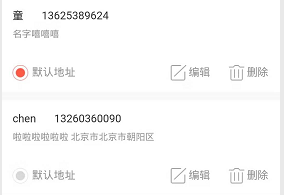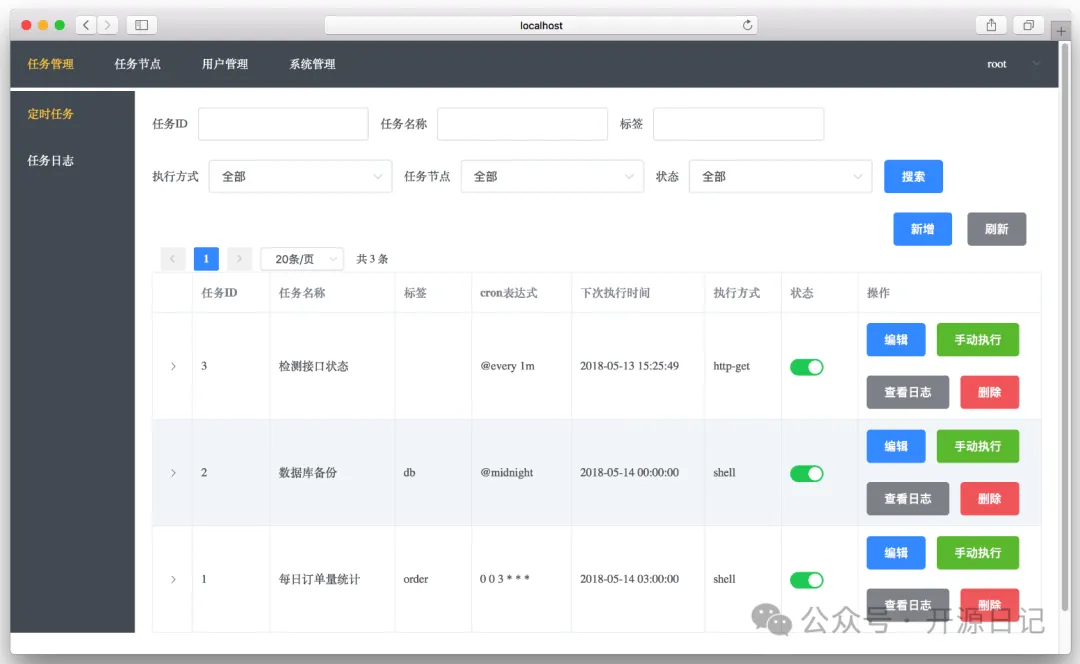目录
WxPython界面用pubsub实现多线程控制
用WxPython做界面时, 如果数据操作时间比较长,会使 WxPython 界面处于假死状态,用户体验非常不好。
WxPython是利用pubsub来完成消息的传送。
下面提供一个 WxPython界面利用pubsub 实现2个线程的控制的例子
实际使用, 只要修改WorkThread1、WorkThread2 里的 run 内容 及 MainFrame 里的 updateDisplay 内容即可。
在此基础上,可以实现多线程。
Python 3.7.3 wxPython 4.0.6 Pypubsub 4.0.3
在此之前有个单线程及进度条的例子,简单需求可以参考这个
下面提供本文的代码
# encoding: utf-8
\"\"\"
@author: 陈年椰子
@contact: hndm@qq.com
@version: 1.0
@project:test
@file: wx_thread.py
@time: 2022-3-24 15:34
说明
\"\"\"
import wx
from pubsub import pub
from time import sleep
import time
import threading
import sys
from random import random
# 线程调用耗时长代码
class WorkThread1(threading.Thread):
def __init__(self):
\"\"\"Init Worker Thread Class.\"\"\"
threading.Thread.__init__(self)
self.breakflag = False
self.start()
def stop(self):
self.breakflag = True
# 耗时长的代码
def workproc(self):
while True:
if self.breakflag:
pub.sendMessage(\"update\", mstatus=\'查询Thread中断\')
sleep(2)
break
ts1 = time.strftime(\'%Y-%m-%d %H:%M:%S\', time.localtime(time.time()))
t_sum = \"查询的结果\"
# print(ts1,t_sum)
# 此处加的数据库代码
pub.sendMessage(\"update\", mstatus=\'{}:查询最后10个数据并汇总{}\'.format(ts1, t_sum))
sleep(10)
pub.sendMessage(\"update\", mstatus=\'workdone\')
return \"\"
def run(self):
\"\"\"Run Worker Thread.\"\"\"
pub.sendMessage(\"update\", mstatus=\'workstart\')
self.workproc()
# 线程调用耗时长代码
class WorkThread2(threading.Thread):
def __init__(self):
\"\"\"Init Worker Thread Class.\"\"\"
threading.Thread.__init__(self)
self.breakflag = False
self.start()
def stop(self):
self.breakflag = True
# 耗时长的代码
def workproc(self):
while True:
if self.breakflag:
pub.sendMessage(\"update\", mstatus=\'随机数Thread中断\')
sleep(2)
break
ts1 = time.strftime(\'%Y-%m-%d %H:%M:%S\', time.localtime(time.time()))
t_info = \"随机数{}\".format(str(random()))
# print(ts1, t_info)
# 此处加的数据库代码
pub.sendMessage(\"update\", mstatus=\'{}:产生{}\'.format(ts1, t_info))
sleep(1)
pub.sendMessage(\"update\", mstatus=\'workdone\')
return \"\"
def run(self):
\"\"\"Run Worker Thread.\"\"\"
pub.sendMessage(\"update\", mstatus=\'workstart\')
self.workproc()
class MainFrame(wx.Frame):
\"\"\"
简单的界面
\"\"\"
def __init__(self, *args, **kw):
# ensure the parent\'s __init__ is called
super(MainFrame, self).__init__(*args, **kw)
self.SetSize(size=(600, 400))
# create a panel in the frame
pnl = wx.Panel(self)
# and put some text with a larger bold font on it
self.st = wx.StaticText(pnl, label=\"分析工具 V 2022\", pos=(25, 25))
self.st2 = wx.StaticText(pnl, label=\"提示\", pos=(25, 80))
font = self.st.GetFont()
font.PointSize += 2
font = font.Bold()
self.st.SetFont(font)
self.st2.SetFont(font)
# create a menu bar
self.makeMenuBar()
self.gauge = wx.Gauge(self, range=100, size=(500, 20))
self.gauge.SetBezelFace(3)
self.gauge.SetShadowWidth(3)
sizer = wx.BoxSizer(wx.VERTICAL)
sizer.Add(self.st, 0, wx.BOTTOM | wx.ALIGN_CENTER_VERTICAL, 0)
sizer.Add(self.st2, 0, wx.BOTTOM | wx.ALIGN_CENTER_VERTICAL, 0)
sizer.Add(self.gauge, 0, wx.BOTTOM | wx.ALIGN_CENTER_VERTICAL, 0)
self.SetSizer(sizer)
# and a status bar
self.CreateStatusBar()
self.SetStatusText(\"启动完成!\")
pub.subscribe(self.updateDisplay, \"update\")
def makeMenuBar(self):
\"\"\"
A menu bar is composed of menus, which are composed of menu items.
This method builds a set of menus and binds handlers to be called
when the menu item is selected.
\"\"\"
# Make a file menu with Hello and Exit items
fileMenu = wx.Menu()
# The \"\\t...\" syntax defines an accelerator key that also triggers
# the same event
# helloItem = fileMenu.Append(-1, \"&Hello...\\tCtrl-H\",
# \"Help string shown in status bar for this menu item\")
self.startItem = fileMenu.Append(-1, \"开始\",
\"开始工作\")
self.stopItem = fileMenu.Append(-1, \"停止\",
\"中断工作\")
fileMenu.AppendSeparator()
self.exitItem = fileMenu.Append(-1, \"退出\",
\"退出\")
# Now a help menu for the about item
helpMenu = wx.Menu()
aboutItem = helpMenu.Append(-1, \"关于\",
\"WxPython 界面与线程通讯的例子\")
# Make the menu bar and add the two menus to it. The \'&\' defines
# that the next letter is the \"mnemonic\" for the menu item. On the
# platforms that support it those letters are underlined and can be
# triggered from the keyboard.
self.menuBar = wx.MenuBar()
self.menuBar.Append(fileMenu, \"工作\")
self.menuBar.Append(helpMenu, \"信息\")
# Give the menu bar to the frame
self.SetMenuBar(self.menuBar)
self.stopItem.Enable(False)
self.count = 0
# Finally, associate a handler function with the EVT_MENU event for
# each of the menu items. That means that when that menu item is
# activated then the associated handler functin will be called.
self.Bind(wx.EVT_MENU, self.OnStart, self.startItem)
self.Bind(wx.EVT_MENU, self.OnStop, self.stopItem)
self.Bind(wx.EVT_MENU, self.OnExit, self.exitItem)
self.Bind(wx.EVT_MENU, self.OnAbout, aboutItem)
def OnExit(self, event):
\"\"\"Close the frame, terminating the application.\"\"\"
try:
self.work1.stop()
self.work2.stop()
sleep(2)
except:
pass
self.Close(True)
sys.exit()
def OnStart(self, event):
self.work1 = WorkThread1()
self.work2 = WorkThread2()
def OnStop(self, event):
self.work1.stop()
self.work2.stop()
def OnAbout(self, event):
\"\"\"Display an About Dialog\"\"\"
wx.MessageBox(\"分析工具 v2019\",
\"关于\",
wx.OK | wx.ICON_INFORMATION)
def updateDisplay(self, mstatus):
\"\"\"
Receives data from thread and updates the display
\"\"\"
# print(\'pub display\', mstatus)
if mstatus.find(\"workstart\") >= 0:
self.SetStatusText(\'开始工作,代码不提供中断线程语句,请等待!\')
self.startItem.Enable(False)
self.stopItem.Enable(True)
self.exitItem.Enable(False)
if mstatus.find(\"workdone\") >= 0:
self.SetStatusText(\'完成!\')
self.stopItem.Enable(False)
self.startItem.Enable(True)
self.exitItem.Enable(True)
else:
if mstatus.find(\"查询\")>=0:
self.st.SetLabel(mstatus)
else:
self.st2.SetLabel(mstatus)
# if mstatus.find(\",\") > 0 and mstatus.find(\"计算\") >= 0:
# mdata = mstatus.split(\',\')
# # 示范 , 实际使用需要传送进度
# # print(int(mdata[0].replace(\'计算\',\'\')))
# g_count = int(mdata[0].replace(\'计算\', \'\'))
# self.gauge.SetValue(g_count)
def test():
app = wx.App()
frm = MainFrame(None, title=\'分析工具\')
frm.Show()
app.MainLoop()
if __name__ == \"__main__\":
test()
运行后, 点击 工作-开始。 2个线程开始工作,直到点击工作-结束

以上为个人经验,希望能给大家一个参考,也希望大家多多支持。
© 版权声明
THE END











暂无评论内容